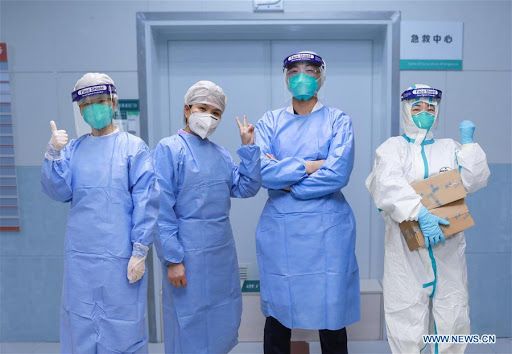For 49-year-old Kong Lingtao, the celebration of this year’s International Labor Day took on special significance.
“I cooked for the doctors and nurses during the SARS outbreak 17 years ago. I am happy I can do the same when the coronavirus struck,” said Kong, the vice president of the Tianjin cuisine association.
His story began on March 7, when he and seven other chefs in north China’s Tianjin Municipality brought five tonnes of goods and food ingredients to Wuhan, to cook hometown dishes for the Tianjin medical team. The team had already been working in Wuhan for over a month.
The next morning, Kong got up at 5 a.m. to prepare something special. He poured batter and eggs into a pan and sprinkled on some green onions. He made Tianjin-style pancakes, a popular traditional snack for breakfast.
“My pancakes were popular among the medics. They stood in a long queue while I was cooking,” Kong said. “I lost count how many pancakes I had made, but I remember that 400 eggs were used up in just three hours.”
Foods with hometown flavor offered consolation and energy to the medical workers. Kong said when fighting the epidemic in an unfamiliar city, “family dishes might offer comfort.”
The 14 days spent cooking in Wuhan were hectic. Kong shot short videos of his cooking and shared them on Tik Tok. He has received nearly 1 million likes so far.
Under a video clip, a man whose wife was a medical worker in Wuhan left a message saying his wife loved a Chinese home-cooked dish — shredded pork with garlic sauce, and wished the chef could cook for her.
Kong and other cooks immediately readjusted the menu, and added the dish on the next day’s list.
“The medics protect people’s lives, and we chefs try our best to ‘protect’ their appetite. It’s my most important task in Wuhan,” Kong said.
Many eateries in Tianjin have resumed normal operations and restored dine-in service as the efforts to curb the epidemic paid off. Kong was involved in guiding the work resumption of the catering industry in Tianjin.
“We asked restaurants to take customers’ temperatures at the entrance, arrange customers at separate tables and offer them serving chopsticks and spoons,” Kong said.
Many workers like Kong also did their best in the battle against the coronavirus.
Zhang Weihua, a 47-year-old truck driver from Shandong Province, have been transporting vegetables from the production bases in Shandong to a logistics park of agricultural products in Tianjin over the past three months, with a total traveling distance of 20,000 km.
Just a few days after the Spring Festival, a traditional Chinese festival for family reunions, Zhang received a pass for transport of emergency supplies.
Wearing a mask, gloves and goggles, he hit the road. It took him four to five hours for a single trip.
“People need fresh vegetables, especially in such times. I have to deliver to them as soon as possible,” Zhang said.
About 600 truck drivers like Zhang have brought 260,000 tonnes of fresh vegetables to the logistics park from nationwide during the epidemic, ensuring supply to the city and stabilizing the prices.
While Zhang was driving, Meng Aifang, a sanitation worker, had been working since the Spring Festival. Cleaning streets and sterilizing over 50 garbage bins, 31-year-old Meng had to work from 5 a.m. to 7 p.m. every day.
The tasks were simple but time-consuming. To ensure she will not miss a single bin, she drew a map of her working area with a dense array of dots on it, each dot representing a garbage bin.
According to the Tianjin Municipal Commission of Urban Management, there are about 17,000 sanitation workers in Tianjin and almost all of them stuck to their posts during the epidemic.
So many ordinary workers from all walks of life gathered strength to contribute to China’s epidemic fight, and the receding epidemic and the return to normalcy would be the most valuable prize to repay their hard work on Labor Day.
“Hearing a ‘thank you’ from a stranger, I felt all the hardships have been worth it,” Meng said.











